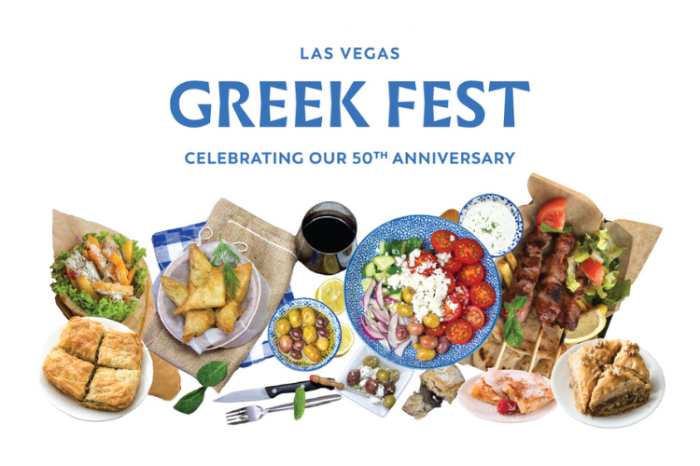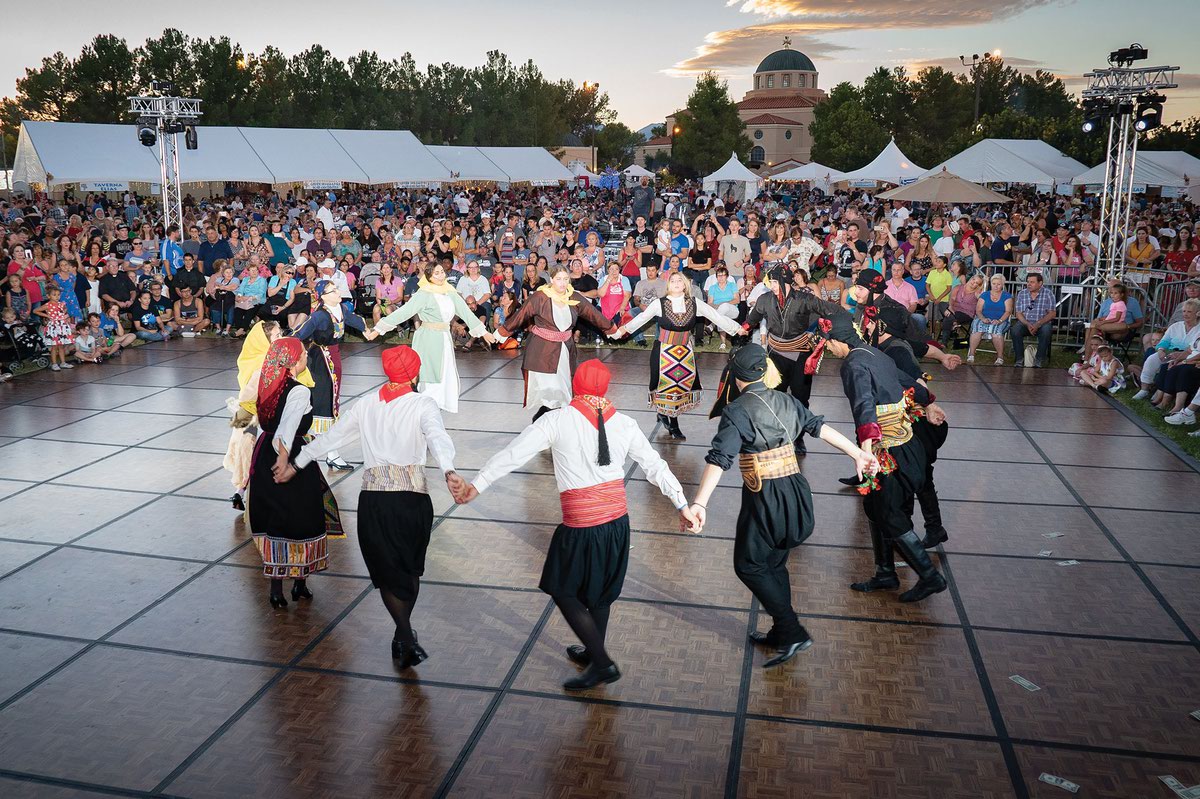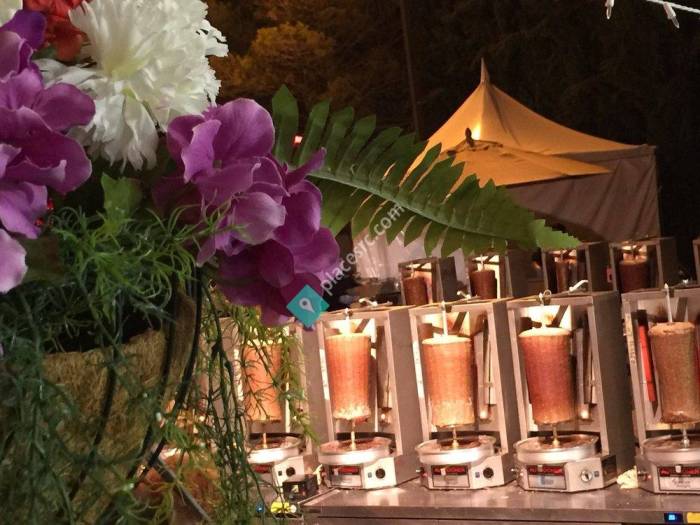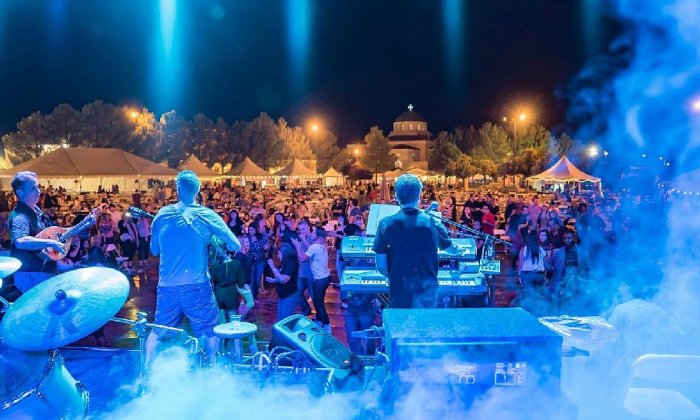Las Vegas Greek Festival explodes onto the scene each year, a vibrant tapestry woven from centuries-old traditions and the electric energy of the city. It’s more than just a festival; it’s a journey through the heart of Hellenic culture, a delicious feast for the senses, and a powerful testament to the enduring spirit of a community. Get ready to dive into a world of mouthwatering food, captivating music, and breathtaking dance, all under the dazzling Nevada sun.
From its humble beginnings, the festival has blossomed into a major Las Vegas event, attracting thousands of attendees each year. This growth reflects not only the increasing popularity of Greek culture but also the dedication and hard work of the organizers and volunteers who pour their hearts into creating this unforgettable experience. The festival’s evolution is a story in itself, one marked by innovation, community spirit, and a deep commitment to preserving and sharing the rich heritage of Greece.
History of the Las Vegas Greek Festival

The Las Vegas Greek Festival, a vibrant celebration of Hellenic culture, boasts a rich history interwoven with the growth of the Greek community in the desert. Its origins are humble, springing from the desire of a small group of Greek immigrants to share their heritage and traditions with a wider audience. Over the decades, the festival has evolved from a modest gathering to a major cultural event, attracting thousands of attendees and showcasing the dynamism of Greek life in Las Vegas.
The festival’s evolution reflects the changing demographics and aspirations of the Greek community in Las Vegas. Early iterations likely focused on showcasing essential aspects of Greek culture: food, music, and dance. As the community grew and diversified, so too did the festival, incorporating more elements of Greek history, art, and religious traditions. The expansion reflects a broader trend: the desire to not just preserve, but also actively share and celebrate a rich cultural heritage in a new and dynamic environment.
Early Years and Establishment, Las Vegas Greek Festival
The exact founding date of the Las Vegas Greek Festival is difficult to pinpoint definitively, lacking readily available archival documentation. However, based on anecdotal evidence from long-time community members, the festival’s beginnings can be traced back to the late 1970s or early 1980s. These early events were likely smaller, community-focused affairs held in church halls or rented spaces. The initial focus was on providing a space for the small Greek community to connect, share food, and enjoy traditional music and dance.
Imagine a scene of families gathering, the air filled with the aroma of roasting lamb and the sounds of bouzouki music. These early gatherings laid the foundation for the large-scale event it is today.
Growth and Expansion
As the Greek community in Las Vegas expanded, so did the festival. Over the years, the festival moved to larger venues, incorporating more elaborate stage productions, expanded food offerings, and a wider range of cultural exhibits. The increased scale attracted a broader audience, not just members of the Greek community but also individuals curious about Greek culture and traditions.
This growth is a testament to the festival’s ability to adapt and evolve, meeting the demands of a growing audience while staying true to its cultural roots. One could imagine the transition from small church halls to expansive outdoor spaces, reflecting the community’s increasing confidence and the festival’s growing popularity.
Significant Events and Milestones
While a precise timeline of every event is not readily available, several key milestones mark the festival’s growth. For instance, the move to a larger venue, perhaps a park or convention center, signifies a significant expansion. The introduction of specific cultural exhibits, like art displays or historical presentations, would also represent a broadening of the festival’s scope. The involvement of notable Greek artists or cultural figures would further elevate the festival’s profile.
The increasing number of attendees, a quantifiable measure of success, underscores the festival’s popularity and its ability to attract diverse crowds. Each of these moments represents a step in the festival’s journey from a small community gathering to a major cultural event.
Anecdotal Stories and Memories
Many long-time attendees recall cherished memories from past festivals. Stories of delicious food, vibrant dances, and the warmth of community spirit are often shared. For example, one might hear tales of a particularly memorable performance by a renowned Greek musician, or the joy of sharing a traditional meal with newfound friends. These anecdotes, passed down through generations, are integral to the festival’s identity, representing the shared experiences and cultural continuity that the festival fosters.
These personal stories help to solidify the festival’s place in the hearts of the Las Vegas Greek community and beyond.
Cultural Aspects of the Las Vegas Greek Festival

The Las Vegas Greek Festival isn’t just a celebration; it’s a vibrant tapestry woven with threads of ancient traditions and modern expressions of Greek culture. It offers a powerful immersion into the heart of Hellenism, showcasing the richness and diversity of Greek heritage in a compelling and engaging way for both the Greek diaspora and the wider community. This immersive experience goes beyond food and music; it’s a testament to the enduring spirit of a civilization that has shaped Western thought and culture for millennia.The festival masterfully represents key cultural elements integral to Greek identity and history.
These elements are not simply displayed; they are actively experienced, allowing attendees to connect with the essence of Greek culture on a deeply personal level. The festival serves as a dynamic platform for preserving and promoting these traditions for future generations, ensuring the continuation of a rich cultural legacy.
Traditional Greek Food and Drink
The aroma of roasting lamb, the sight of glistening baklava, and the taste of refreshing ouzo—these are sensory experiences that immediately transport attendees to the sun-drenched landscapes of Greece. The festival’s food stalls offer a comprehensive culinary journey, representing regional specialties from across the country. From hearty souvlaki to delicate spanakopita, each dish tells a story, reflecting centuries of culinary tradition and innovation.
The abundance of food available is a testament to Greek hospitality, mirroring the generous spirit of welcoming guests with an abundance of food and drink. This isn’t merely a meal; it’s a communal experience that fosters a sense of shared identity and belonging.
Traditional Greek Music and Dance
The rhythmic pulse of bouzouki music and the vibrant energy of traditional Greek dances are undeniably captivating. These performances are not mere entertainment; they are powerful expressions of Greek identity, history, and emotion. The dances, often accompanied by spirited singing, tell stories of love, loss, celebration, and resistance. The intricate steps and graceful movements reflect centuries of cultural evolution, preserving and transmitting a vital aspect of Greek heritage.
The performances frequently showcase both traditional and contemporary styles, reflecting the adaptability and evolution of Greek culture. This blend of old and new ensures that the tradition remains relevant and engaging for audiences of all ages.
Religious and Spiritual Traditions
The Greek Orthodox Church plays a central role in Greek culture, and its influence is subtly yet powerfully felt throughout the festival. The presence of religious icons, the subtle use of religious symbolism in decorations, and the overall atmosphere of community and faith contribute to the festival’s unique character. This is not a forceful imposition of religious belief but rather a gentle acknowledgment of the profound role that faith plays in shaping Greek identity and community.
The festival subtly demonstrates the interconnectedness of faith and culture, illustrating how spiritual beliefs have shaped societal norms and practices throughout Greek history.
Greek Crafts and Art
The festival showcases a variety of traditional Greek crafts and artwork, offering attendees a glimpse into the artistic talents and skills of Greek artisans. From intricately designed pottery to hand-woven textiles, these items represent generations of craftsmanship and cultural expression. The sale of these items not only supports the artisans but also helps preserve and promote these traditional skills.
This is more than a marketplace; it’s a celebration of creativity and ingenuity, demonstrating the artistic legacy that has enriched Greek culture for centuries. The presence of these crafts serves as a tangible link to the past, connecting attendees to the rich history of Greek artistry.
Community Involvement in the Las Vegas Greek Festival

The Las Vegas Greek Festival isn’t just a celebration of Hellenic culture; it’s a vibrant testament to the power of community engagement. Years of dedicated effort by local Greek organizations and the broader Las Vegas community have transformed this annual event into a significant cultural and economic contributor to the city. Its success hinges on the collaborative spirit and shared commitment to showcasing Greek heritage while simultaneously enriching the lives of Las Vegans from all backgrounds.The festival’s success is deeply intertwined with the active participation of numerous local Greek organizations.
These groups, representing diverse facets of Greek life in Las Vegas, contribute significantly to the festival’s planning, execution, and overall atmosphere. Their collective expertise ensures the event remains authentic to Greek traditions while adapting to the unique dynamics of the Las Vegas landscape.
Role of Local Greek Organizations
Various Greek organizations in Las Vegas play crucial roles, from securing sponsorships and managing logistics to preparing traditional food and coordinating performances. For example, the local chapters of the AHEPA (American Hellenic Educational Progressive Association) and the Daughters of Penelope often take the lead in organizing specific aspects of the festival, such as the cooking of authentic Greek dishes or the coordination of the traditional Greek dances.
These organizations provide the human capital and organizational structure that make the festival possible. Their involvement ensures the festival’s authenticity and continuity, year after year. The seamless operation of the festival relies heavily on the expertise and dedication of these organizations, reflecting the strong sense of community within the Greek-American population of Las Vegas.
Benefits to the Wider Las Vegas Community
The Las Vegas Greek Festival extends its benefits far beyond the Greek community. It serves as a significant economic driver for the city, attracting thousands of visitors who patronize local businesses, hotels, and restaurants. The festival’s vibrant atmosphere fosters cross-cultural understanding and appreciation, enriching the diverse tapestry of Las Vegas. Moreover, the festival’s charitable contributions support local organizations, reflecting a commitment to giving back to the wider community.
This economic injection and community engagement enhance the overall vibrancy of Las Vegas.
Community Outreach Initiatives
The festival actively engages in community outreach initiatives. A significant portion of the proceeds from the festival often goes to local charities and non-profit organizations. This philanthropic aspect solidifies the festival’s position as a positive contributor to the broader Las Vegas community. Furthermore, the festival frequently features educational exhibits showcasing aspects of Greek history, art, and culture, fostering a greater understanding and appreciation of Hellenic heritage among attendees of all backgrounds.
This educational component transforms the festival into more than just a celebration; it becomes a platform for cultural exchange and understanding.
Ways to Participate or Support the Festival
Individuals can actively participate in or support the Las Vegas Greek Festival in numerous ways.
Here are some key avenues for involvement:
- Attend the Festival: Simply attending the festival is a direct way to support the event and experience the rich Greek culture firsthand.
- Volunteer: Volunteering your time and skills is a valuable contribution to the festival’s success. Many roles are available, from food preparation to event setup and cleanup.
- Donate: Financial contributions, no matter the size, directly support the festival’s operations and its charitable initiatives.
- Become a Sponsor: Businesses can sponsor the festival, gaining valuable exposure while supporting a worthwhile community event.
- Share the Word: Spreading the word about the festival through social media and word-of-mouth helps attract more attendees and increases the event’s overall impact.
Visual Representation of the Festival

The Las Vegas Greek Festival is a vibrant spectacle, a captivating blend of tradition and modern presentation. Its visual impact is carefully crafted, leveraging color, symbolism, and carefully chosen elements to create an immersive experience that transports attendees to the heart of Greek culture. The overall effect is one of joyous celebration, rich history, and warm hospitality.The festival’s visual appeal is strategically designed to evoke a sense of place and time, creating a powerful and memorable experience for attendees.
This is achieved through a masterful orchestration of color, symbolism, and carefully selected visual elements.
Festival Decorations
The festival grounds are transformed into a miniature Greece. Think brilliant whitewashed buildings, meticulously recreated in miniature, interspersed with lush greenery. Banners depicting iconic Greek scenes – ancient ruins, sun-drenched landscapes, and bustling marketplaces – flutter in the breeze. String lights, twinkling like a million stars, illuminate the night, creating a magical atmosphere. These decorations aren’t simply haphazard additions; they’re carefully chosen to evoke the spirit and beauty of Greece, creating a powerful sense of immersion for visitors.
The meticulous attention to detail is evident in every aspect, from the carefully chosen fabrics to the vibrant colors used in the decorations.
Traditional Costumes
Costumes play a pivotal role in the festival’s visual narrative. Attendees, particularly those participating in dances and performances, wear traditional Greek attire. These costumes are not simply clothing; they are living embodiments of history and culture. Women might grace the festival in flowing, brightly colored dresses, often adorned with intricate embroidery. Men might sport crisp white shirts, dark trousers, and perhaps a vest, often with a distinctive sash.
The vibrancy of the colors – deep blues, rich reds, sunny yellows – further enhances the overall visual spectacle, reflecting the spirit of celebration and the warmth of the Greek culture. The costumes are not merely decorative; they tell a story, a visual testament to generations of tradition.
Food Presentation
Even the food presentation contributes to the overall visual feast. The array of Greek delicacies is not simply arranged; it’s carefully displayed, showcasing the artistry and pride involved in creating these culinary masterpieces. Imagine glistening platters of souvlaki, the meat perfectly browned and glistening under the lights. Picture trays overflowing with baklava, its layers of filo pastry a golden testament to culinary skill.
The presentation of the food itself is an art form, a visual extension of the cultural richness on display. The careful arrangement of the food, the use of vibrant colors, and the sheer abundance create a compelling visual narrative that complements the other elements of the festival’s aesthetic.The overall visual impression of the Las Vegas Greek Festival is one of vibrant energy and captivating beauty.
It’s a carefully curated experience that successfully blends traditional elements with modern presentation, creating a spectacle that is both authentic and unforgettable. The festival’s visual elements work in harmony to create an immersive and engaging experience, leaving a lasting impression on all who attend.
The Las Vegas Greek Festival isn’t just an event; it’s a living, breathing embodiment of Greek culture, a vibrant celebration that leaves a lasting impression. The sights, sounds, and tastes transport you to the sun-drenched shores of Greece, while the warmth and hospitality of the community remind you of the power of shared heritage and human connection. Whether you’re a seasoned festival-goer or a curious newcomer, mark your calendar – this is an experience you won’t want to miss.